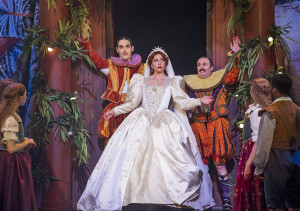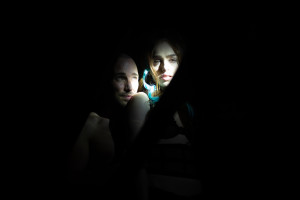Kiss Me Kate

A revival of ‘Kiss Me Kate,’ the Cole Porter musical that’s been around for more than half a century, is now being performed at the London Coliseum for two weeks only.
Taking over the space which was briefly occupied by the show ‘Chess,’ ‘Kiss Me Kate’ takes a musical look, of the misconstrued shenanigans that take place behind the scenes of a musical. For a show that’s two hours and 50 minutes long, that’s quite a long haul to get from the beginning of the story to the end, and in the middle it’s all a bit of silliness and nonsense.
The cast within the show are performing ‘The Taming of the Shrew,’ and ‘Kiss Me Kate’ has as it’s plot the conflict between the show’s stars Fred (Quirijn De Lang) and leading lady Lilli (Stephanie Corley) – who used to be married, and Lois (Zoe Rainey) and her gangster boyfriend Bill (Alan Burkitt).
Fred writes a love letter intended for Lois, but it’s Lilli who receives it. Lilli is actually engaged to someone else but is actually still in love with Fred. Meanwhile, Bill has signed an IOU to gangsters, in Fred’s name, and the gangsters come to the show to retrieve their money. But it’s Lilli who ends up paying for it as when she reads the note and sees it’s not actually for her, she wants to leave the show, but the gangsters (John Savournin and Joseph Shovelton) prevent her from leaving so that they can get their money from Fred (who is also the producer of the show). All this leads, as you can image, to lots of mayhem and madness – cue the laughter.
‘Kiss Me Kate’ is not really well-known for any memorable songs nor as a really great musical (‘Oklahoma’ is ‘Kiss Me Kate’s’ contemporary, and it’s a classic). While all the actors soldierly slog through such a long show and sing their hearts out in a show that’s more operatic and less razzle dazzle, it’s a bit difficult to keep one’s attention, especially when one of the final songs – ‘Brush Up Your Shakespeare’ – goes on and on and on, and is repeated endlessly. So if Cole Porter is your thing, then you have very limited time to catch this show. If he is not your thing, it’s OK to give it a miss.
To book, click here:
 A disease is wiping out the human race, and those unlucky enough to be positive will die a slow death. This is the premise of the hard-hitting and surreally erotic play ‘Beirut.’
A disease is wiping out the human race, and those unlucky enough to be positive will die a slow death. This is the premise of the hard-hitting and surreally erotic play ‘Beirut.’





